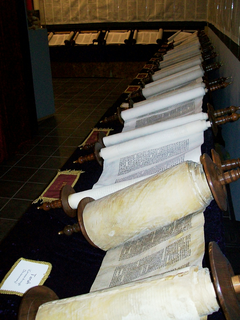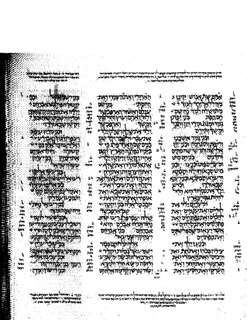Related Research Articles

The Bible is a collection of religious texts, writings, or scriptures sacred in Christianity, Judaism, Samaritanism, Islam, Rastafari, and many other faiths. It appears in the form of an anthology, a compilation of texts of a variety of forms that are all linked by the belief that they are collectively revelations of God. These texts include theologically-focused historical accounts, hymns, prayers, proverbs, parables, didactic letters, admonitions, essays, poetry, and prophecies. Believers also generally consider the Bible to be a product of divine inspiration.

The Book of Chronicles is a book in the Hebrew Bible. Chronicles is the final book of the Hebrew Bible, concluding the third section of the Jewish Tanakh, the Ketuvim ("Writings"). It contains a genealogy starting with Adam and a history of ancient Judah and Israel up to the Edict of Cyrus in 539 BCE.

The Book of Kings is a book in the Hebrew Bible and two books in the Christian Old Testament. It concludes the Deuteronomistic history, a history of Israel also including the books of Joshua and Judges and the Books of Samuel.

The deuterocanonical books are books and passages considered by the Catholic Church, the Eastern Orthodox Church, the Oriental Orthodox Churches, and the Assyrian Church of the East to be canonical books of the Old Testament, but which Protestant denominations regard as apocrypha. They date from 300 BC–AD 100, mostly from 200 BC–AD 70, before the definite separation of the Christian church from Judaism. While the New Testament never directly quotes from or names these books, the apostles most frequently used and quoted the Septuagint, which includes them. Some say there is a correspondence of thought, and others see texts from these books being paraphrased, referred or alluded to many times in the New Testament, particularly in the Pauline epistles, depending in large measure on what is counted as a reference.

Hezekiah, or Ezekias, was, according to the Hebrew Bible, the son of Ahaz and the 13th king of Judah.

The Old Testament is the first division of the Christian biblical canon, which is based primarily upon the 24 books of the Hebrew Bible or Tanakh, a collection of ancient religious Hebrew writings by the Israelites. The second division of Christian Bibles is the New Testament, written in the Koine Greek language.

The Codex Sinaiticus, or "Sinai Bible", is one of the four great uncial codices, ancient, handwritten copies of a Christian Bible in Greek. The codex is a historical treasure.

The Hebrew Bible or Tanakh, is the canonical collection of Hebrew scriptures, including the Torah, the Nevi'im, and the Ketuvim. These texts are almost exclusively in Biblical Hebrew, with a few passages in Biblical Aramaic.

"Jesus wept" is a phrase famous for being the shortest verse in the King James Version of the Bible, as well as many other versions. It is not the shortest in the original languages. It is found in the Gospel of John, chapter 11, verse 35. Verse breaks—or versification—were introduced into the Greek text by Robert Estienne in 1551 in order to make the texts easier to cite and compare.

The chapter and verse divisions did not appear in the original texts; they form part of the paratext of the Bible. Since the early 13th century, most copies and editions of the Bible present all but the shortest of these books with divisions into chapters, generally a page or so in length. Since the mid-16th century, editors have further subdivided each chapter into verses – each consisting of a few short lines or sentences. Esther 8:9 is the longest verse in the Bible. Sometimes a sentence spans more than one verse, as in the case of Ephesians 2:8–9, and sometimes there is more than one sentence in a single verse, as in the case of Genesis 1:2.

The Biblia Hebraica Stuttgartensia, abbreviated as BHS or rarely BH4, is an edition of the Masoretic Text of the Hebrew Bible as preserved in the Leningrad Codex, and supplemented by masoretic and text-critical notes. It is the fourth edition in the Biblia Hebraica series started by Rudolf Kittel and is published by the Deutsche Bibelgesellschaft (German Bible Society) in Stuttgart.

Ezra–Nehemiah is a book in the Hebrew Bible found in the Ketuvim section, originally with the Hebrew title of Ezra. The book covers the period from the fall of Babylon in 539 BC to the second half of the 5th century BC, and tells of the successive missions to Jerusalem of Zerubbabel, Ezra, and Nehemiah, and their efforts to restore the worship of the God of Israel and to create a purified Jewish community.

A Catholic Bible is a Christian Bible that includes the whole 73-book canon recognized by the Catholic Church, including the deuterocanon—a term used by some scholars and by Catholics to denote the books of the Old Testament which are in the Greek Septuagint collection but not in the Hebrew Masoretic Text collection.

A biblical canon, also called canon of scripture, is a set of texts which a particular Jewish or Christian religious community regards as authoritative scripture. The English word canon comes from the Greek κανών, meaning "rule" or "measuring stick". It was first used in the 18th century to refer to Christian scriptures, but Dead Sea scrolls scholar Eugene Ulrich identified the concept as Jewish.

2 Chronicles 32 is the thirty-second chapter of the Second Book of Chronicles the Old Testament in the Christian Bible or of the second part of the Books of Chronicles in the Hebrew Bible. The book is compiled from older sources by an unknown person or group, designated by modern scholars as "the Chronicler", and had the final shape established in late fifth or fourth century BCE. This chapter belongs to the section focusing on the kingdom of Judah until its destruction by the Babylonians under Nebuchadnezzar and the beginning of restoration under Cyrus the Great of Persia. The focus of this chapter is the reign of Hezekiah, king of Judah.
References
- ↑ Due to differences in versification, some Bibles call this verse 1 Chronicles 6:26
- ↑ Due to differences in versification, some Bibles call this 1 Chronicles 6:6
- ↑ T. K. Cheyne; J. Sutherland Black, eds. (1901) [1899]. "Ethni". Encyclopaedia Biblica: A Critical Dictionary of the Literary, Political, and Religious History, the Archaeology, Geography, and Natural History of the Bible. 2, E–K. New York: The Macmillan Company.